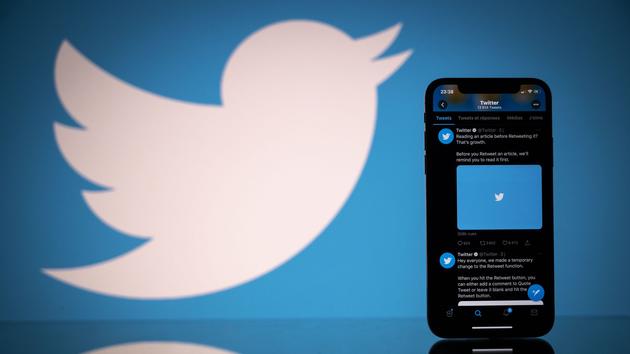Benjamin Sire is a composer and journalist
.
"
We have become a nation of 66 million prosecutors
."
This recent sentence from the President of the Republic was pronounced to denounce the incessant criticism of the health policy to fight against Covid.
In fact, it applies just as well, and undoubtedly better, to network expression, which has transformed some of them, and especially Twitter, into a real people's court, whose justice would no longer be. than a possible auxiliary.
If this transformation of Twitter and other networks into a judicial agora has materialized gradually, at the same time as the precepts of the cancel culture of Anglo-Saxon origin were advancing, it is undoubtedly the #MeToo wave ( appeared timidly in 2007, but made notorious in 2017 as part of the Weinstein affair), which brought this movement into a new dimension and slipped a laudable initiative towards a form of arbitrariness, particularly in its French version, #BalanceTonPorc, encouraging victims to nominally expose their attackers on the networks.
Abyssus abyssum invocat.
At the present time, well beyond questions of sexual violence, racism (real or supposed) or any harassment, there is not a week without the networks not throwing in to food such or such a personality for acts. ranging from the most truly criminal to the simple crime of opinion, or considered as such by those who raise it.
The Maxime Cochard affair, named after this elected member of the Parisian PCF (whom we know and whose revelations to which he is the subject leave us speechless, without it being up to us to judge the veracity of it, nor to contest the sincerity of his accuser), denounced on Twitter for acts of rape with the help of his companion on the person of a young man who was then 18 years old, is the latest illustration of this, and we will come back to it quickly.
These denunciations in the end very often avoid the judicial or administrative box supposed to be responsible for these problems.
But stars or semi-celebrities are no longer the only ones concerned by this public unpacking.
We can no longer count the groups or hashtags that flourish on such and such a network and claim to #Balance their “
something or their someone
”.
Thus, a trivial research carried out by a relative made us discover jumbled up #BalanceTonTatoueur, #BalanceTaStartUp, #BalanceTonAgency, #BalanceTonEcoleSup, #BalanceTonStage, and many other projections, the primary purpose of which is to free the words of victims of various assaults and discriminations.
Only here, these denunciations in the end very often evade the judicial or administrative box supposed to have the load of these problems, without knowing finally what happens to the plaintiffs, as well as to the victims.
And this is where the shoe pinches.
It unveils a society where the denunciation and / or the court of opinion, which have always existed but did not know how to tie up to any media, mainly replace the judicial power, going so far as to instruct the latter to follow his recommendations on pain of definitively doing without him.
The Cochard affair bears witness to this.
Reacting to the accusations concerning him, and after being removed from his main responsibilities by his party (the PCF), he decided to file a complaint against his accuser.
He thus used a procedure offered to him by the rule of law, and this formulation is not innocent.
However, many Twitter users have simply denied him the simple possibility of doing so, considering that, since he had been denounced, he was in essence guilty and therefore, not condemnable, but already condemned.
Going to court to defend yourself if you consider yourself violated in your rights, in a case put in the public place, would therefore be synonymous with additional contempt against a victim?
There is no longer any institutional mediation.
The only report that is worthwhile is that of the individual sample of a cause, an identity or a group, directly appealing to public opinion, without recourse to justice seems essential.
The judicial institution and its proverbial slowness, however, have a strong responsibility in the phenomenon that we describe, just like, contrary to its initial will, the famous #MeToo movement already mentioned.
The slowness of justice and the complexity of the procedures, leads many people to express themselves directly on the networks, in order to take public opinion to witness.
By dint of testimonies which led the prosecution to initiate certain cases involving well-known people, very many others concerning anonymous individuals fell behind in their treatment, which was naturally very long.
We have seen it in a case involving the companion of your servant, the investigation of which, despite the accumulation of material facts, has dragged on for more than four years, without yet being closed.
Admittedly, the move to the courthouse and the health crisis have happened there, and have caused an additional extension of processing times.
But this slowness, just as much as the cost and complexity of the procedures, leads many people to express themselves directly on the networks, in order to call public opinion to witness, sometimes to bring the authorities (more and more reactive on the canvas) to manifest itself, sometimes to bypass its action.
To this is added, mainly in matters of rape (subject to a judgment at the assizes), the too large proportion of them who are reclassified as sexual assault (examined in correctional), either because of the absence of sufficient material elements, either to protect the victim from a potentially traumatic trial.
Thus, Liberation, dated July 21, 2020, informed us that a "
study carried out within the Bobigny high court (one of the few providing figures on the subject) estimated that in 2013 and 2014," 46% of sexual assaults were rape correctional
”.
These different elements can undoubtedly help to justify the referral to the first instance of the new means of claim that social networks constitute, more than the courts.
Regardless of these obstacles inherent in the functioning of justice, these new networked interpellations take us to the heart of a society where the encounter between liberalism, individualism and digital, which we have already mentioned on several occasions in these columns, has provoked a telluric crash.
Thus, in a previous article we wrote: “
These transformations are multiple and diverse, but are all linked to the shift of societies structured around their institutions and their intermediary bodies towards a set of singularities which are no longer found in any common. and claim their autonomy.
[…] The demand is no longer properly social and common, it no longer aims to create a just and egalitarian society, but to allow each individual to go in search of his own emancipation in the jungle of singularities.
"
To read also:
Redeker: "Social networks, this new Leviathan without borders"
This Twitter tribunal, which we are evoking, is an emanation of this phenomenon, even if it advances under two opposite trajectories which, at their junction point, end up creating a vicious circle.
The first movement goes from traditional media (primarily television and testimonial books) to Twitter, while the second is sourced from Twitter before feeding into the media, often through the introductory streaming news channels.
These two movements, independently of the role of individuals, bear witness once again to Twitter-dependence on the press and the bubble effect it generates, which we mentioned in particular in the article "
Twitter, the mirror to larks
”.
Twitter-dependence on the press is one of the sine qua non conditions for the echo that can be given to the individual stories that now abound on the web.
In the subtly but duly hierarchical world of the press, the lower castes, made up of freelancers who are often precarious and close to idleness, scour the blue bird network on the lookout for a story to tell, for lack of real background, or of lucrative buzz, and produce a more or less opportune media frenzy from the story of a tweeter.
This Twitter-dependence on the press is one of the sine qua non conditions for the echo that can be given to the individual stories which now abound on the web.
To read also:
Benjamin Sire: "Twitter, the mirror with larks"
Thus, according to the first movement mentioned, social networks are, as Alain Finkielkraut notes, himself often caught more or less voluntarily in the turmoil of bad buzz, the continuation of what agitates television debates.
We have seen this through media coverage of works by Valérie Springora and Camille Kouchner (and before them, that of Tristane Banon), in the Matzneff and Duhamel cases, which then ignited the networks.
But this process is in a certain way more traditional and, perhaps, saving, given the gravity of the evoked facts and the capacity of the books quoted to break the omerta which reigns in a certain Parisian elite, already perceived in the DSK case.
The second trajectory is completely new, and arguably more problematic, although it has the virtue of allowing anonymous people to fight on equal terms against establishment figures.
But it does not prevent the risk of seeing the legitimate emotion of public opinion meet with a simple desire for revenge or a mythomania much more detrimental to all the victims than to the perpetrators.
Where Camille Kouchner, Valérie Springora, Tristane Banon, but also Adèle Haenel, and all the plaintiffs who accused Harvey Weinstein, can bring a subject to the table by traditional means (press, books), thanks to their notoriety, it does not This is not the case for the mass of anonymous people who apparently only have social networks to shed light on their suffering, while forgetting that justice is however very there for that, despite its dysfunctions mentioned above.
In the reign of an individual morality, the other will always be a deviant that it will be advisable to denounce with regard to his own morality put on the front of the stage.
And here we find, again and again, this distrust of intermediary bodies and institutions, particularly highlighted by the movement of yellow vests, but already revealed by the five-year term of Nicolas Sarkozy and the emergence of parties claiming to be , hypocritically, anti-system.
Because, in the reign of an individual morality, or expressed by small groups of more or less convergent interests, the other will always be a deviant that it will be advisable to denounce with regard to his own morality put on the front of the stage. .
As the philosopher and specialist in social and labor relations, Denis Maillard, confided to us: "
This tribunal is a kind of importation on social networks of the good old Stalinist trial: the unveiling of a turpitude is not worth a person a status of accused but precisely a status of culprit.
"
These two movements described also reflect a profound transformation of our relationship to intimacy and modesty, sometimes going so far as to reverse their specificities.
In the ancient world, the exposure of our lives, of our sufferings, as sometimes of our vices, would have been judged as disturbing signs of shamelessness.
In the New World, it is precisely the mark of a certain modesty to stage one's intimacy.
What happens, including in the private sphere, does not really come into existence until it is publicly reported.
The publication now performs an authentication function.
The intimate is not authenticated as such unless it is visible;
it then becomes extime.
What happens, including and especially in the private sphere, does not really come into existence until the moment it is made public.
We also find the same shift in the new ways of living one's religious belief, the expression of which is increasingly exteriorized.
Where faith was previously essentially of the order of the intimate and the spiritual feeling, it manifests itself more and more through its affirmation, in particular by behavior, claims and ostentatious or clothing signs.
Now, in the same way that believing is showing that we believe, suffer, love, laugh, cry, enjoy, see ourselves authenticated by the commitment of Internet users who we take as witnesses, and express themselves in the form of likes and retweets.
This is not very new: it is authentication by language already highlighted by psychoanalysis and linguistics.
What is new is the shift from the authentication scene to networks.
Read also:
Twitter and politics, dangerous connections
This reversal obviously owes a lot to the preeminence of a virtual sociability which plunges us both into the collective melee at the same time as it exacerbates our feeling of loneliness, all the more so in a period of social restrictions imposed by the crisis of Covid.
But it is coupled with the appearance of a new moral order which surreptitiously sends us back to the codes of Victorian society, but also to the Reformation (16th century) and its search for purity and purge of a society of corrupt souls. , to which Twitter would offer a sort of digital renaissance, all things considered.
The main function of Twitter is now public confession.
It gives a major role of sounding board to the neo-Puritan aspirations that are emerging in a Western world increasingly frustrated and disappointed in itself, in search of a moral regeneration whose return to the public scene is sometimes disconcerting, especially since there is currently no Counter-Reformation, or Council of Trent, to oppose it ...









